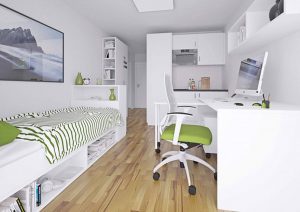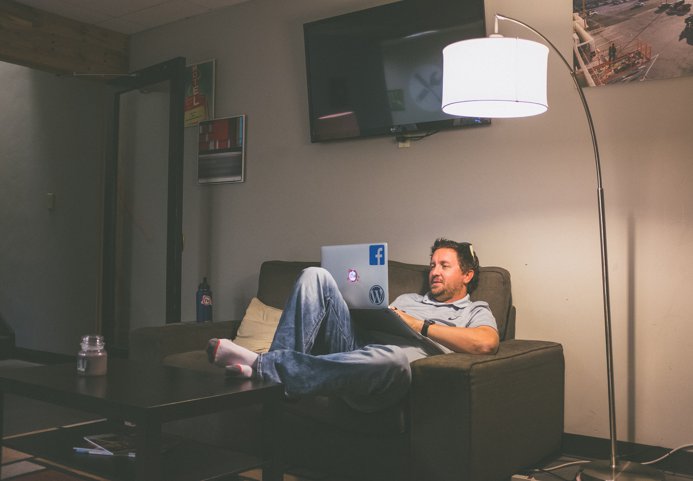How to invest in micro-apartments in Germany?
 The German micro-market is booming. Students are one of the main groups for which this type of property is designed. The volume of transactions in the student housing sector in 2016 amounted to 750 million euros – almost five times more than in 2015.
The German micro-market is booming. Students are one of the main groups for which this type of property is designed. The volume of transactions in the student housing sector in 2016 amounted to 750 million euros – almost five times more than in 2015.
Micro apartments are furnished apartments of 17–35 m² with one bedroom, bathroom and small kitchen.
Micro apartments are furnished apartments of 17–35 m² with one bedroom, bathroom and small kitchen.
As a rule, investors buy micro-apartments for rental not only for students, but also for seconded and seasonal workers, young professionals or tourists: these categories of tenants are looking for a separate comfortable accommodation for reasonable money. In some cases, the owner can live in the apartment itself.
Purchase
Due to the small footage, the cost of micro-apartments is lower than other types of residential real estate: in large German cities (Berlin, Munich, Nuremberg), their cost varies from 120 to 300 thousand euros, taking into account the finishing and furniture, and an additional parking space is sold for 15– 30 thousand
Investors have the opportunity to buy micro-apartments on credit. Foreigners can take a mortgage from a German bank that will cover up to 50% of the value of the property at a rate of about 2% per annum. Loan processing costs about 1% of the loan amount.
It should be borne in mind that the buyer pays the cost of the transaction: 10-15% of the value of the object. They include a purchase tax (3.5–6.5%), a notary fee (1–1.5%), a broker’s commission (3.6–7.1%) and a real estate registration fee in the land register ( 0.8–1.2%).
Taking into account all expenses and mortgages, the minimum amount an investor needs to invest in micro-apartments in Germany is 70 thousand euros. If the buyer already has an account in Europe, then you can purchase micro-apartments without arriving in Germany.
When acquiring micro-apartments during the construction phase, the buyer deposits the money in installments. In case of late payment, the developer has the right to terminate the contract with the buyer.
In most cases, an investor acquiring micro-apartments during the construction phase receives a bank guarantee: if the developer does not build the facility, the bank will be fully compensated by the bank. In some cases, such measures are applied if the developer delays the delivery of the object – then the permissible delay period is prescribed in advance in the contract.
In Germany, housing in new buildings is sold with a five-year guarantee: if the owner finds building defects in the apartment, the developer must eliminate them at his own expense. He also provides a guarantee for interior decoration and furniture – up to two years, depending on the terms of the contract of sale.
Rental income
The average yield of micro-apartments in Germany is 3.5–4.5% per annum. This is more than the yield from the long-term rental of a standard apartment (about 2-3% per annum). For example, micro-apartments of 20 m² in Berlin are rented for 500–600 euros per month, in Munich – for 750–900 euros.
In the case of short and medium-term rent, the rate is indexed in accordance with the growth of the market, and the owner can terminate the rental contract and evict the tenant in case of non-payment. These rules do not work for long-term leases: under the terms of most leases, tenants are protected from evictions and fees for many years to come.
The owner of micro-apartments can rent them out independently or become a participant in the rental pool of shareholders, in which each owner is given a share of ownership in the building – in this case, the management company manages the process of renting apartments and shares the profit between all owners in proportion to their participation. At the same time, it does not matter which apartments are rented and which are not: all owners receive profits.
If the owner, being a member of the rental pool, decides to live in micro-apartments himself, then he no longer participates in the distribution of profits.
If the owner, being a member of the rental pool, decides to live in micro-apartments himself, then he no longer participates in the distribution of profits bilanol.i.ua / Depositphotos
The cost of maintenance and management
When buying micro-apartments, the owners sign a contract with the management company, which assumes all the obligations associated with the lease of the object.
The expenses of owners for the maintenance of micro-apartments amount to about 1.2–2.4 thousand euros per year. This amount includes property taxes and rental income, management and maintenance costs.

